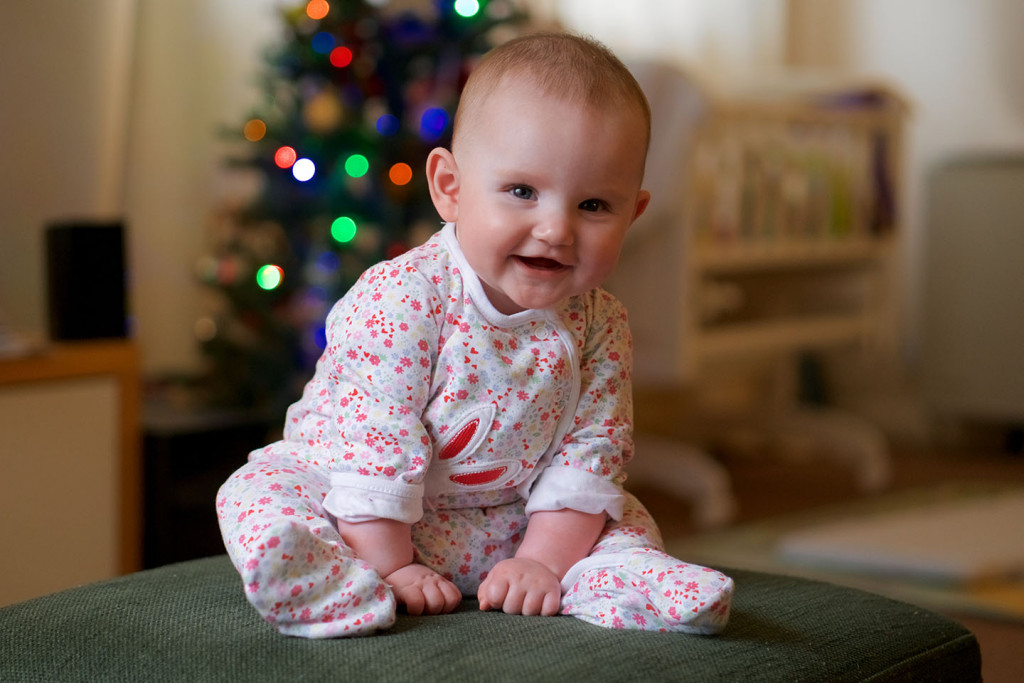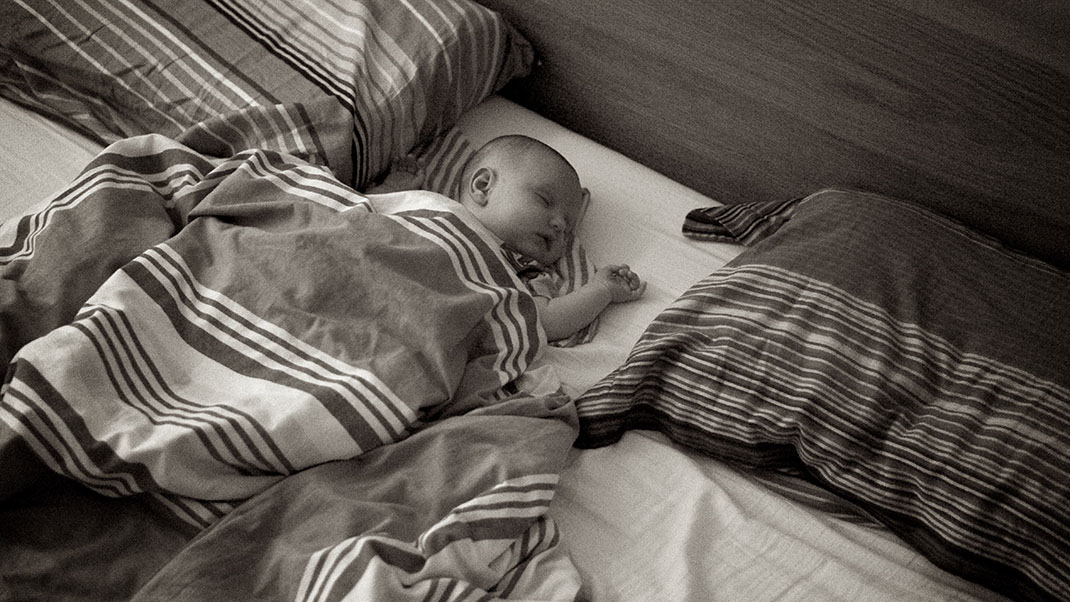I’m writing this in part to reassure friends with babies younger than Ada (which includes BABIES AS YET UNBORN, WOOOOOOOO!) who may find or might be finding things tough going – and who might still be haunted by our ashen faces and shakily-recounted tales of bafflement and exhaustion – and in part just for the exercise of marking this time and exorcising this stuff from my brain. (I actually started writing it a month ago; it just took a while to find space and time to complete.) Here, then, is why things have gotten easier.
The first few weeks of Ada’s life were dazzlingly, bruisingly tough for lots of the usual reasons that everyone will experience – the stakes being so high – and for some more special reasons all of our own. Now, with her a little over four months old (as she was when I started writing at the start of December), we’re beginning to catch our breath. Indeed, we’re beginning to enjoy Ada – and girl, if you’re reading this is twenty years’ time on a holoscreen, please don’t read that as us resenting or disliking you hitherto. It was just vast, exhausting work, and newborns don’t give anything back. Like, they’re not required to – “they didn’t ask to be born” – but it means you’re under heavy physical and emotional stress for hours, days, weeks, and the thing that’s at the centre of the maelstrom your life has become could not give one shit. (Except, you know, in the visceral sense.) I am not saying I’m a good person for finding that challenging, but I am saying I did. Which brings me to the first reason it gets easier.
Start the day with a smile
When I go to get Ada from her cot first thing in the morning, she looks at me, a moment passes and then her face splits into the biggest, cheekiest grin I’ve ever seen, she kicks her legs, she stuffs her fist in her mouth in her transports of delight. “Oh my god, this guy‽” she says, correctly identifying an opportunity to use an interrobang even in body language because she is my daughter; “I bloody love this guy!” And thus, whatever challenges and arguments and perplexities had figured so oppressively in the day before dissolve away in a heartbeat, and we begin afresh. But it took many weeks to get to this stage.
Practice makes piss-easy
The first time you sterilise anything, the first time you put on a nappy, the first time you run a bath, hell, the first time you pick up your baby, you won’t really know what you’re doing and so you’ll spend hours, cumulatively, reading manuals and guides, fussing with holds and fits, and ultimately not believing for a second you have done it right at the end of the process. Give it a couple of months, though, and you’ll do this kind of dull logistical stuff without a second thought, and that not only means you’re spending less time on them but you’re also not filling up your mind with fretting about what are ultimately quite minor things. Don’t get me wrong: we still worry about plenty of shit now, but through the mundane act of doing some things many dozens of time we don’t also worry about them at a bald mechanical level.
Tool up
We read books, we stocked up, we thought we were well-equipped. And we were, but only, it turned out, for a small set of scenarios. For example, because reasons, we decided at about week three to feed Ada expressed milk topped up with formula, which meant bottles. Because this wasn’t really a scenario we’d envisioned (because of the conspiracy of fucking silence about how difficult breastfeeding is, for one thing), we had a bit of a mish-mash of bottles we’d just kinda accreted. Once we actually bought good bottles that Ada liked and figured out the correct flow of teats, and then once we’d actually bought enough of them so that we could have the next full day’s worth sterilised and ready before I went to bed rather than frantically washing and sterilising two or three in a rolling dance of clusterfuck, we were golden.
Other stuff that has helped immensely (most of which were discovered as a result of Jenny’s research):
- Nuk dispensers for formula. Measure the correct number of scoops into these at the end of every day, then the next day when things can be frantic just dump straight into the bottle. (Also, if using powdered formula, buy a Perfect Prep machine or similar. Just do. Ain’t no parent got the brainspace to be boiling kettles half an hour before feeds are required.)
- Also, Nuk bottle cleanser. ‘Light’, not as foamy as usual washing-up liquid, and has an enzyme that specifically targets and breaks down milk. You can see it happen. Great stuff.
- Look, I’m going to tell you we bought one of these baby chairs and I’m going to feel the need to justify the price, but we just love it. It’s somewhere to put Ada down while we’re doing other things (which might be simply ’massaging one’s sacrum while staring into the middle distance’), and she loves it too. It will last her for years, and the only bad thing is that it’s a pain to move around. Oh, and the crippling working class guilt about the price.
- When you buy a sleeping bag or a babygro or whatever, buy the next size up as well at the same time; you’ll need it more quickly than you expect, and having it right there on the day when suddenly nothing fits is a magical gift from past-you.
Anyway, the point is: I suspect nobody has the stuff they need before a baby is born, so don’t even really try. Get the basics (books will tell you what these are) and then just be prepared to make many spur-of-the-moment trips to Boots, and late-night Amazon orders.
We are learning how to parent; Ada is learning how to baby
Newborns are like nothing you’ve ever encountered before, or more precisely caring for one is like nothing you’ve ever encountered before. You’ve literally spent a lifetime learning how to interact with people, and you’ll likely even – as a girlfriend, as a co-worker, as someone with an elderly parent – have spent some time caring for people at some level. Newborns aren’t people. I mean, obviously, they are, but they do not operate like people. This isn’t about babies not being able to articulate “Ah, father; I think the purple dungarees today – I’m feeling vivacious!” or “No, mother, don’t you remember? I took a dislike to Baby Snuggle Book last Wednesday and I simply cannot countenance the woolly sheep today”. No; we know ahead of time that babies can’t talk and that we will have to interpret their needs in other ways. But what actually happens is that they don’t even have the same basic concepts of needs or responses or drivers that adults, children, even toddlers have, and so it’s not even like you can work out what the different cues are and deal with them.
As the weeks ticked by, however, we would more and more often comment “Aw, she’s starting to be a proper little person”, and it was only later I realised that a side-effect of this is that she started being easier to interpret, simply because we’ve had a lifetime of interpreting people. And still this isn’t about knowing specifically what Ada wants; she’s too young, clearly, to form words, and we haven’t properly started with signing. It’s about me doing something funny and her chuckling; it’s about Jenny cuddling her after we’ve given her saline drops to help clear her nose when she had a cold and Ada understanding that a cuddle is comforting; it’s about – oh my days is it – Ada understanding what sleep is.
At the same time as Ada is learning how to be a baby, we’re learning how to be parents. In part we’re just better at mechanics of it, but we’re also just better at knowing how to support each other, how to structure days, how to adapt to the ever-changing process of parenting. We fuck up often, in big and little ways, and there hasn’t been a week where either I or Jenny or both haven’t cried, but we’re now able to at least identify those areas where we need to research more or just sack up more for, rather than just finding literally every aspect of the situation intimidatingly alien.
We are, too, now, the world’s foremost authorities on Ada Margaret Gray Phin. Nobody knows her better than we do, so when well-intentioned advice is offered, we feel confident in listening politely and then quietly, privately ascribing it little relevance to Ada if we believe it’s not applicable. Clearly, we’re not going to dismiss it out of hand, and this doesn’t apply to medical advice or advice from professionals, but equally we’re now experienced enough to know that no, she’s not windy just now; no, that thing she does when feeding doesn’t mean she isn’t hungry; no, there’s no point in trying to get her back to sleep after only a half-hour nap; half-hour naps are what she takes.
What’s more, while in the first two, three, four months we’d live pretty much half-hour to half-hour not knowing what was coming next, she’s settling into routines now, we’re learning her cries (and she’s learning to make different sounds for different things), and we’re using an app to track feeds, sleeps, medication and more so that we can start to see patterns and work out whether behaviours are out of the ordinary.
So: it gets easier. Not easy – presumably never easy – but easier. Everyone told us it would in the first few weeks and months, but we had to live through it to believe it. We have. It does.


